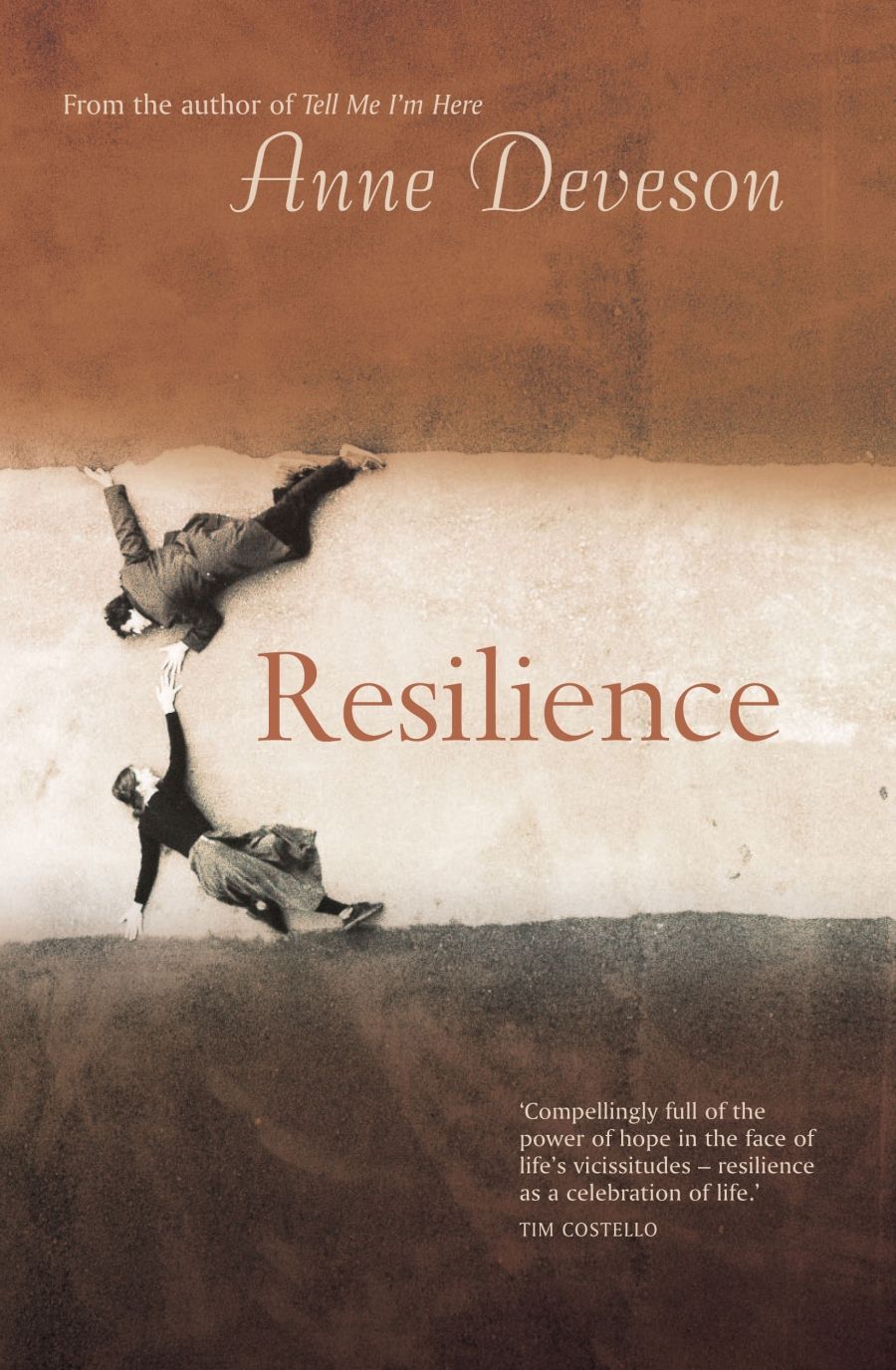
- Free Article: No
- Contents Category: Cultural Studies
- Review Article: Yes
- Article Title: Toxic Ways
- Online Only: No
- Custom Highlight Text:
What is resilience? And why is it an important subject for research? Anne Deveson – former royal commissioner, noted documentary maker and social justice activist – explores these questions in her latest book. Human resilience is linked to courage, love, defiance and stoicism, and enables us to come through suffering with integrity. It requires hope and produces strength and action, while its absence results in weakness and victimhood, even despair. But no one seems sure exactly what it is. Deveson’s book opens with a quotation from Jeanette L. Johnson, suggesting that resilience may be ‘the poetry of life’ and that as yet ‘there is no language to share it’. That does not stop Deveson from trying to contribute to its dissemination.
- Book 1 Title: Resilience
- Book 1 Biblio: Allen & Unwin, $24.95 pb, 288 pp
- Book 1 Cover Small (400 x 600):

- Book 1 Cover (800 x 1200):

Holocaust survivors, Romanian orphans, torture victims, Rwandan child survivors, and athletes struck down at the height of their careers come under her gaze. From the Burma–Thailand railroad to Idi Amin’s Uganda, the revitalisation of a Campbelltown housing estate to the fight of indigenous Australians for justice, Deveson probes for clues as to the nature of this elusive ingredient. The book’s structure reflects Deveson’s facility with the documentary form. It has a five-second-grab feel, cutting from this research finding to that interview, this quotation to that reminiscence. This is not a linear argument, but a net thrown wide, pulling together examples, facts and figures from many disciplines.
Deveson rejects the idea that resilience is a quality given only to the fortunate few. Looking to bio-ecological studies, research into brain plasticity, and Jung, she argues that resilience is an innate survival mechanism, part of every human spirit. Just as a plant’s natural drive to grow can be defeated by circumstance, so the individual can be defeated by adversity. Prevalent negative myths such as predetermination contribute to this breakdown. Deveson declares herself positive, a ‘half-full glass’ person, frustrated by efforts that focus on problems and detail the factors that make for failure while ignoring the secret wisdom to be found in studying success. Such studies are essential, she argues, to the future of society.
However, Deveson reveals a pessimistic streak in her belief that consumerism, economic rationalism and rampant individualism are threatening human and environmental resilience. But are such values imposed on humans from without? Why do previously resilient cultures abandon old ‘positive’ structures for all the glitz of ‘toxic’ Western ways? I couldn’t help thinking of the environmentalists who champion Gaia against the onslaught of Homo sapiens, forgetting that Gaia herself is our source. If resilience is ‘organic’, might not these contrary thrusts also arise from deep within us? This might prove an equally provocative study.
‘Don’t imagine that this book is written by an expert in the practice of resilience,’ Deveson writes. But the challenges of her own life are extensively explored. She acknowledges the mentors and exemplary adults in her life. She places herself firmly within the structures of family, society, culture and spirituality, admitting that in different circumstances she may have proven less resilient.
Woven through these studies is the narrative of Deveson’s discovery of a different kind of resilience – the capacity for love that secretes itself in a tired heart. Collaboration on the book brings her together with American ‘defrocked economist’ Robert Theobold. She finds herself attracted to, and ultimately courted by, him. The story unfolds of the strengthening relationship between these two indefatigable, erudite sixty-somethings. Because it does not have a happy ending, Deveson uses the challenges surrounding love and its inevitable grief as material for her resilience study. The chapters devoted to Theobold’s death paradoxically contain all the elements Deveson found integral to resilience in life: love, a support network, honesty, a fighting spirit and the need for humour. An appropriate community structure – in this case, medical expertise to alleviate suffering and indignity – also plays an essential part.
Alongside Resilience, I was reading a text on computers in education. Each section began: At the end of this chapter you will be able to … My knowledge of hardware, software and pedagogy was measurable, its application identifiable. No such promise comes with Deveson’s book. I found the many threads of its non-linear argument hard to grasp. Figures in one place show that lack of funding to support the poor increases their vulnerability to family and community breakdown. In another, statistics indicate that middle-class children are as susceptible to suicide and despair as poorer youth, and Deveson states that wealth does not bring happiness and social stability; in fact, it often breeds a sense of futility. She suggests that resilience was more prevalent in the hard times gone by, when people knew they had to be resilient or die. Yet she argues for a kinder, gentler society where struggle, it seems, would be alleviated.
Resilience asks questions, raises issues and suggests connections, but offers no answers. It made me wonder if resilience is measurable from without. The basketball rings of life are at a standard height, but some of us are shorter than others. One player’s goal may come with little effort. Another may draw on more spring and strength, but still miss the dunk. How would we know?
Having been a bemused exhibitor of resilience myself – recovering years ago from a nervous breakdown during which language itself deserted me – I have often asked, ‘Why have I survived and flourished while others have not?’ I am not religious, but nonetheless am tempted to believe in ‘grace’. Perhaps it is ‘only’ this quicksilver element, resilience.


Comments powered by CComment